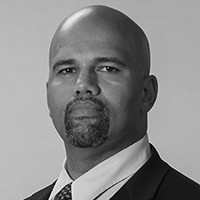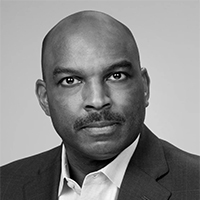Historic Document
1984 (1949)
George Orwell | 1949
Summary
The Cold War (1945-89), that ideological and proxy war waged between the former Soviet Union and the United States colored not only policy but a good amount of late-twentieth century literature. Perhaps the most noted and widely read of the books of the era is 1984, by George Orwell. Though British, Orwell’s writing with the American anti-Stalinist – and, eventually, staunchly anti-Communist – Partisan Review, and the influence of 1984, a book that became standard reading for American schoolchildren for decades, fairly places this work of Orwell into the Founders’ Library. And the Orwellian “Big Brother” that portended the coming of massive state surveillance affords an eerie concept that is oft used in modern-day parlance to describe too much state intervention into Americans’ private affairs.
Selected by

Christopher Brooks
Professor of History, East Stroudsburg University

Kenneth Mack
Lawrence D. Biele Professor of Law, Harvard Law School
Document Excerpt
He opened the diary. It was important to write something down. The woman on the telescreen had started a new song. Her voice seemed to stick into his brain like jagged splinters of glass. He tried to think of O’Brien, for whom, or to whom, the diary was written, but instead he began thinking of the things that would happen to him after the Thought Police took him away. It would not matter if they killed you at once. To be killed was what you expected. But before death (nobody spoke of such things, yet everybody knew of them) there was the routine of confession that had to be gone through: the grovelling on the floor and screaming for mercy, the crack of broken bones, the smashed teeth, and bloody clots of hair. Why did you have to endure it, since the end was always the same? Why was it not possible to cut a few days or weeks out of your life? Nobody ever escaped detection, and nobody ever failed to confess. When once you had succumbed to thoughtcrime it was certain that by a given date you would be dead. Why then did that horror, which altered nothing, have to lie embedded in future time?
He tried with a little more success than before to summon up the image of O’Brien. ‘We shall meet in the place where there is no darkness,’ O’Brien had said to him. He knew what it meant, or thought he knew. The place where there is no darkness was the imagined future, which one would never see, but which, by foreknowledge, one could mystically share in. But with the voice from the telescreen nagging at his ears he could not follow the train of thought further. He put a cigarette in his mouth. Half the tobacco promptly fell out on to his tongue, a bitter dust which was difficult to spit out again. The face of Big Brother swam into his mind, displacing that of O’Brien. Just as he had done a few days earlier, he slid a coin out of his pocket and looked at it. The face gazed up at him, heavy, calm, protecting: but what kind of smile was hidden beneath the dark moustache? Like a leaden knell the words came back at him:
“WAR IS PEACE
FREEDOM IS SLAVERY
IGNORANCE IS STRENGTH”



